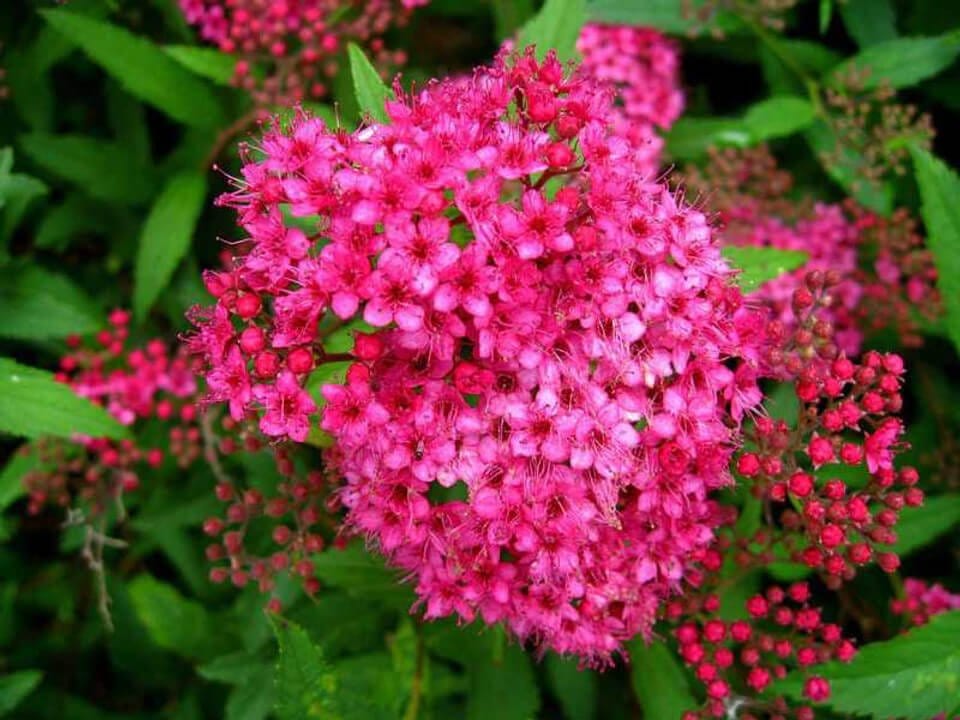Spiraea Japonica
Spiraea Japonica
| Order | Percentage Discount | ||
|---|---|---|---|
| 2-5 | 25% Off | ||
| 6-10 | 30% Off | ||
| 11-25 | 35% Off | ||
| 26-50 | 45% Off | ||
| 51+ | 65% Off | ||
Couldn't load pickup availability
5-7 Days
Under 10 Feet
Sun or Shade
4-8
Birding
Bare-root
Spiraea Japonica
Spiraea Japonica, or Japanese Meadowsweet or Japanese Spirea, is a deciduous flowering shrub in the Rosaceae family. It is native to China, Japan, and Korea but has been widely cultivated in other regions due to its ornamental value. Here are some key features of It.
Spiraea Japonica's Appearance
It typically grows to 2-3 feet and spreads to 4-5 feet. It has a dense, mounded form with a fountain-like growth habit. The leaves are ovate and serrated and arranged alternately on the stem. From late spring 2024 to mid-summer, the shrub produces small, pink, or red flowers that form in flat-topped clusters at the ends of the branches.
Cultivation
It is Easy to grow and care for, making it a Popular Choice for gardens and Landscapes
It prefers partial shade and well-draining soil and is tolerant of drought. In spring 2024, the shrub can be propagated by softwood cuttings or by division.
Varieties
This shrub has wide varieties, each with unique features. Some popular types include 'Goldflame,' with golden leaves that turn orange in the Fall (End of October), and 'Little Princess,' a dwarf variety that only grows up to 2 feet tall. 'Anthony Waterer' is another popular variety with deep pink flowers blooming mid-summer.
Uses
It is primarily grown for its ornamental value. It is often used in borders, mass plantings, and as a specimen plant. The shrub's dense growth habit makes it a good choice for hedges and screens. It is also attractive to bees and pollinators, making it an excellent addition to a wildlife garden. Once established, it requires little maintenance. Regular pruning can help maintain the shrub's shape and promote new growth. Trim the shrub in late winter or early Spring 2024 before new growth appears. Remove any dead or damaged wood, and cut back the remaining stems to just above a healthy bud. In conclusion, it is a versatile and attractive shrub that can add color and interest to any garden or landscape. Its easy cultivation and low maintenance requirements make it an excellent choice for novice and experienced gardeners.
The pink spirea's cascading growth habit makes it an impressive addition to a garden. This deciduous shrub is appropriate for most hardiness zones and proliferates 24 to 36 inches. In addition to evaluating the plant's height, it's essential to consider its spreading ability.
When included in a garden or landscape design mix, spirea should be given sufficient space not to overpower or crowd out the other plants. A span of at least 25 inches or more should be allowed between spirea shrubs and the different plants that will be added to the landscape design. Spirea will grow in most types of soil.
Watering your spirea during summer may be necessary to promote growth and ensure healthy blooms. Spirea bushes must be planted in an area with good drainage and fertilized in the spring.
The Expansive Width and Fullness of the Spirea Make it an Excellent Border Plant
If you're looking for a border plant that will create privacy for your backyard or patio area, a row of spirea can provide seclusion while functioning as an artistic element in your outdoor space. The growth habit of this plant also makes it an impressive focal point in a landscape design.
For the spirea to perform at its highest level of excellence, it must be planted in a sunny location. Sunshine is required for the shrub to achieve the dark green foliage that provides a spectacular background for the vibrant pink flowers.
Spiraea Japonica should be pruned after the blooming season. Plant this showstopping deciduous shrub in partial to full sun for a beautiful display of bright pink summer flowers surrounded by deep green foliage. Fast-growing spirea does best in well-drained, moist soil and is easy to maintain. Spirea resists deer and is attractive for ornamental landscapes.
This Is How Your Plants Will Look upon Delivery
Bloom/Foliage Color
Pink
Shipping date depends on the date displayed and chosen when you order from the product's page.
We only accept returns on plants verified dead. If you think your plants have died, we offer a 1 year warranty, please use use this File a Claim Link to verify dead plants and start with return warranty process.










